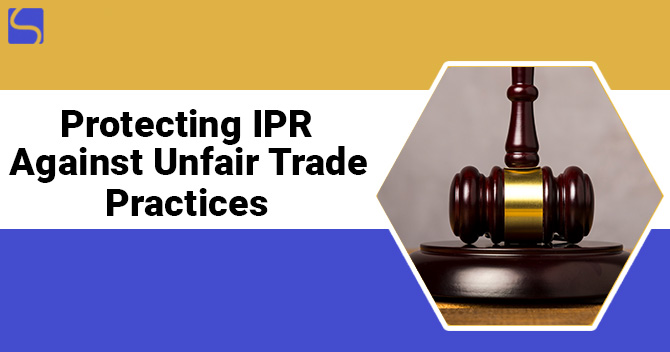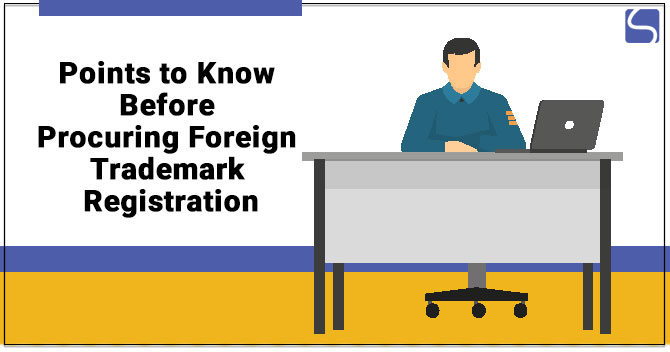Protecting IPR Against Unfair Trade Practices

Karan Singh | Updated: Oct 25, 2021 | Category: Intellectual Property
The significance or importance of Intellectual Property Rights (IPR) was first discussed in the Paris Convention in 1883 and the Berne Convention in 1886 for the protection of Industrial Property and Literary & Artistic Work, respectively. Now, India is an important member of the World Trade Organisation (WTO) and hence, a party to its TRIPS Agreement. India is also a member of the World Intellectual Property Organisation (WIPO). However, in the past few years, India has introduced various laws for protecting IPR against Unfair Trade practices and for their citizens in compliance with various International Conventions & Treaties. There have been regular modifications in the IPR Policy Regime of India. Scroll down to check more information regarding protecting IPR against Unfair Trade Practices.
Table of Contents
What are Intellectual Property Rights (IPR)?
IPR or Intellectual Property Rights are the exclusive rights facilitated to individuals over the creation of their minds. They generally give the author or creator an exclusive right over the usage of their creation for a specific time. There are different types of IPR:
- Trademark;
- Copyright;
- Patent;
- Design;
- Industrial Property;
- Trade Secrets.
What are the Current Laws Protecting IPR Against Unfair Trade Practices in India?
Following are some important laws regarding protecting IPR against Unfair Trade Practices in India:
- Trademarks Act, 1999[1];
- The Design Act, 2000;
- The Copyright Act, 1957;
- Protection of Plant Varieties & Farmers Right Act, 2001;
- The Patents Act, 1970, which was changed or amended in 2005;
- Information Technology Act, 2000;
- The Semiconductor Integrated Circuits Layout Design Act, 2000;
- The Geographical Indication of Goods (Registration & Protection) Act, 1999.
Protecting IPR against Unfair Trade Practices is very important for several reasons. It is vital to identify the Intellectual Property Rights of the creators and give them protection from violation/infringement and exploitation to:
- Promote inventions in the technology & culture field;
- For the protection of creator’s right;
- To increase the economic growth, thereby establishing new industries & creating new job opportunities;
- To provide transfer of technology in several ways to ensure the easiness of doing business;
There are many examples where businesses have implemented Unfair Trade Practices to take benefit of the work of other opponents or competitors in the market. On the other hand, Unfair Trade Practices are being used for the illegal use of one’s IP, while on the other side, the owner of the rights over specific IP is misusing their dominant position in the market through pooling, refusal, and other unfair practices. So, to avoid market distortion and to manage fair competition by preventing illegal use of IP, there is a need to control unfair trade practices. It is vital to maintain a healthy and well-balanced between IP protection & Competition Policy in the Indian Market to have a fair playing field for the emerging industry.
The acts which are opposite to truthful practices are considered as acts of unfair competition. So the protection of IPR against Unfair Trade Practices is usually to serve the interest of business competitors. Customers may be the first victim of the unfair competition, but the protection to the customer is mainly incidental & not the only purpose of unfair competition. Now with the improvement in various factors, the protection of IPR against Unfair Trade Practices is not only limited to business competitors but also serves the public interest, which assists in customer protection.
What Do You Mean by Unfair Trade Practices?
Unfair Trade Practices can be considered as activities that use various fraudulent, deceptive, unethical or misleading ways to run business. Various activities like misleading representation of a good or service tied selling, deceptive pricing, fake gift offers, refusal to grant a license, etc., are included under the vision of Unfair Trade Practices. For example, misrepresentation of the conditions, benefits, or terms of any policy is an Unfair Trade Practices.
As an ordinary rule, any practice or Act implemented in the course of industrial/commercial activities contrary to fair or truthful practices constitutes an act of Unfair Competition, the decisive criterion being “Contrary to Truthful Practices”.
Following are some trade practices that can be unfair:
- Distribution of misleading/false information that can harm the business interests;
- Distribution of incorrect or misleading information to customers;
- Deceptive use of another’s Trademark, product labelling, firm name, or product packaging;
- Unofficial receipt, distribution or use of confidential scientific, production, technical, trade information, or business.
Competition Law in India – Protecting IPR against Unfair Trade Practices
Protecting IPR against Unfair Trade Practices or competition has been noticed as one of the main goals of the IP system, which prevents any act of competition that is in opposition to fair practices in business or industry-related matters, referred to as “Unfair Competition”. The limitations on Unfair Trade Practices safeguard the consumers against the exclusive right owners of IP by confirming that they don’t misuse their leading position in the market. In India, there are two legislations, i.e., Competition Act, 2002 & Consumer Protection Act, 2019, that make sure the competition in India should be fair by protecting the customers’ rights against the exclusive right of the IP owners.
- Competition Act, 2002: This Act was introduced in India with an objective of the economic growth of the nation; for the creation of a Commission to restrict practices having an unfavourable effect on competition, to encourage & sustain competition in markets, to safeguard the customers’ interest and to make sure the freedom of trade executed by various players, and for matters connected therewith or incidental thereto. This Act tries to shift the focus from restricting monopolies to encouraging fair competition so that market in India is equipped to fight with the market globally.
- Consumer Protection Act, 2019: It’s a necessary act that aims to safeguard the customers from business exploitation. It cancelled the Consumer Protection Act, 1986, to expand the Act’s scope by increasing the rights of customers & liabilities of sellers. In simple words, it safeguards the customers from influences of the forcible power of sellers by means of unfair trade practices to restrict competition.
Conclusion
Protecting IPR against Unfair Trade Practices and competition is to boost innovation & growth in the market. It doesn’t intend to restrict market competition. However, there are some activities that take place in the market & are inequitable for the competition, so the Competition Act intends to control such activities and regulate competition in the market. It is still challenging to decide whether the current Act is feasible enough to confirm fair competition in the Indian market without any obstructions and restraining the use of Intellectual Property Rights.
Read our article:What are the Benefits of IPR in the Modern Times?














